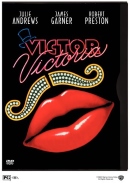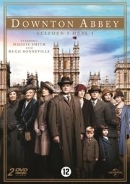:: ARTIKELS ::
INTERVIEW BILL TECK
Type: Interview - Datum: 2023-01-03 - Geplaatst door: Didier
Met het overlijden van Peter Bogdanovich verdween vorig jaar één van de laatste Amerikaanse regisseurs die met hun manier van filmen het verschil maakten. We hadden een uitgebreid gesprek met Bill Teck, vriend van Peter en maker van de documentaire One Day Since Yesterday, die gaat over They All Laughed, de cultfilm van Peter met in de hoofdrol zijn betreurde vriendin Dorothy Stratten.DVDInfo: Beste Bill, sinds Peter Bogdanovich is overleden zijn er heel veel dingen over hem geschreven, maar de rode lijn in al deze artikels was zeker het feit dat hij wordt beschouwd als de laatste icoon van een generatie regisseurs die tegelijkertijd gepassioneerde filmliefhebbers zijn. Ben je het daarmee eens, en hoe zie je Peter als regisseur?
Bill: Ik denk dat je gelijk hebt. Het is echt triest, want ik ben erg blij dat Coppola nog leeft, of Friedkin en Scorsese. Maar we zijn Robert Altman en John Cassavetes reeds verloren. Ze waren niet alleen filmliefhebbers, maar ze hebben ook iets nieuws gedaan. Peter was wel een traditionele filmmaker, maar vooral een stoutmoedige. Peter doet me vaak denken aan Bruce Springsteen, in die zin dat hij tegelijkertijd één van de oudste rocksterren is, maar ook één van de eerste. Ik zou durven beweren dat Peter Bogdanovich de schakel is tussen de oude garde van Hitchcock, Hawks, Ford, Sturges en Lubitsch met de nieuwe generatie van Altman, Coppola, Scorsese en Spielberg. Ik zie Peter als de enige die tussen beide werelden zat. Peter voelde zo'n affiniteit met Springsteens muziek omdat die een link had met muziek van vroeger, maar het is tevens doordrenkt met een zeer moderne esthetiek. Net als Peter werkte Springsteen binnen een gevestigde vorm, maar op een geheel nieuwe manier. En er is een heel cool essay over Peter en Bruce en de dingen die ze gemeen hebben, alsook de dingen die ze delen met John Ford. Dat essay werd gepubliceerd tijdens het filmfestival van Buenos Aires, en kreeg als titel Peter Bogdanovich: El Ultimo Testigo (The Last Witness), en is geschreven door festivaldirecteur Javier Porta Fouz.
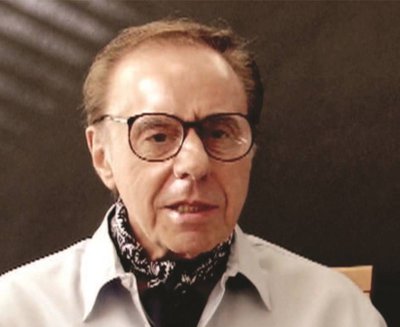
Je was een zeer goede vriend van Peter, hoe heb je hem ontmoet en was je niet te veel onder de indruk van hem? Ik las onlangs een citaat van een Belgische filmcriticus die zei dat het erg moeilijk was om met Peter in contact te komen omdat hij een nogal gereserveerde persoon was.
Ja, hij was gereserveerd. En natuurlijk was ik ongelooflijk geïntimideerd. Ik wilde hem zien en tegelijkertijd wilde ik mijn boek laten signeren. Dat was Who The Hell Is In It?, een boek over acteurs. Ik bracht ook mijn They All Laughed-poster mee. Toen ik in de rij stond te wachten, stond de moeder van mijn zoon erop dat ik hem een vraag zou stellen. Die zei, je moet hem toch iets vragen. Het probleem was echter welke vraag ik mijn grote held, Peter Bogdanovich, zou gaan stellen! Ik dacht gewoon ik ga iets zeggen, en wel dit... Ik zei: "Peter, je hebt nu de hele avond gesproken over al deze geweldige regisseurs en alle dingen die ze hebben gedaan en hoe geweldig hun films zijn. Maar weet je, jij hoort ook in dat rijtje thuis." Hij glimlachte alleen maar en zei "Ok, ik zal dat noteren." Toen hij daarna mijn poster zag van They All Laughed, vroeg hij me "Oh mijn god, waar heb je dit vandaan?" Ik zei: "Nou, het is mijn favoriete film", waarop hij me vroeg "Dus je hebt hem gezien?" Ik voegde er meteen aan toe dat ik ook Saint Jack had gezien en dat ik die op dvd had, en dat ik die zelfs schonk aan vrienden zodat ze konden zien hoe goed die was. Toen ik hem vertelde dat ik zelf een filmmaker was en dat in mijn films hommages aan hem zaten vroeg hij me om ze hem te bezorgen. Toen begonnen we over Love Is A Gambler dat hij speciaal voor Johnny Cash had geschreven, en hij was oprecht geraakt. Het was echt een speciaal moment voor mij, want ik ben gewoon dol op hem. Daarna begonnen we over Tarantino te praten en Peter had meteen door dat ik zelf ook een fervent filmliefhebber ben. Maar op dat moment kreeg ik ook schrik om mijn eigen stomme films aan hem te tonen. Maar op een avond kreeg ik een soort van kosmische, spirituele ervaring waarbij ik naar de Everglades rende en met veel kracht en magie terugkwam en vijf jaar (!) later mailde ik hem met de vraag of hij ze nog wilde zien. Ik kan je gewoon niet eens vertellen wat dat voor mij betekende en hoe dat mijn leven veranderde. Ik ben daarna een goede vriend van hem geworden. En wat me opviel was hoe aardig hij was, en hoe beleefd en hoe attent hij was.
Peter hield van acteurs, maar hij hield ook van regisseurs van wie hij zelfs sterren maakte. Peter zelf was vaak te zien in trailers om zijn eigen films te promoten. Weet je hoe Peter omging met de huidige situatie waarin er bijna geen ruimte meer is om de namen van de regisseurs te tonen als de film begint?
Dat is inderdaad een erg interessante opmerking. Peter begreep de waarde van een regisseur en hoe belangrijk die was voor een film. En, weet je, hij begreep het op dezelfde manier als Tarantino dat begrijpt. Eigenlijk denk ik dat Quentin Peter kopieerde. Wat grappig is, want Peter spiegelde zich steeds naar Lubitsch, Sturges en Capra. Peter droeg dat beeld mee naar de jaren zeventig, en ik weet niet eens of veel mensen dat wel begrepen. En wat die trailers betreft, wanneer Otto Preminger een film maakte, dan introduceerde hij die ook door een trailer. Toen Peter dat ook deed begon ook Wes Anderson dat te waarderen. Peter vertelde me dat Spike Lee een fan van hem was, en hij doet dat ook. Het is dus begrijpen dat het helpt om de film te verkopen en dat het mensen helpt de film te begrijpen. Ik heb nooit met hem gesproken over mensen die de aftiteling inkrimpen, maar ik weet dat dat hem zou frustreren omdat in zijn films zelfs de aftiteling een verlengstuk van de film was.
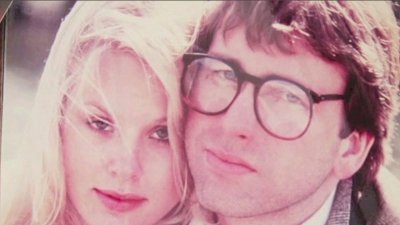
Tegenwoordig is het moeilijk om een regisseur te zijn in Hollywood als je een eigen visie hebt. In veel opzichten was Peter een rebel. Heb je enig idee wat Peter vond van de huidige situaties waarin streamingdiensten alle voorgekauwde lijntjes volgen?
Weet je, hij moest altijd vechten voor zijn films. Vorig jaar sprak ik met hem rond Kerstmis en hij was zeer enthousiast over een film die hij samen met Louise aan het schrijven was over George en Ira Gershwin. En ik weet dat een heel grote filmregisseur wiens naam ik niet ga noemen, die film naar Netflix zou brengen, zodat hij als producent kon optreden en het kon laten maken met Peter als regisseur. Peter was ook zo gepassioneerd toen hij Wait For Me Made probeerde rond te krijgen. Peter wist hoe moeilijk het was, maar hij liet zich daardoor in zijn werkethiek geen moment door afschrikken. Op dezelfde manier zag hij destijds zijn vader opstaan, en zodra het licht was begon hij te schilderen tot het licht uit was om daarna 2 uur piano te spelen. Soms voelde dat griezelig aan, want ik weet niet hoe je zo'n brein moet gaan categoriseren, maar hij had een ongelooflijke focus op feiten en details. Hoewel ik hem in interviews wel hoorde zeggen dat hij niet zo blij was met de huidige stand van zaken wat films betreft, liet hij er zich nooit door afschrikken.
Denk je eigenlijk dat Peter zijn films nu zou kunnen maken als toen? Ik bedoel, hoe geniaal ze ook zijn, de meeste waren risico's voor studio's. Een zwart-witfilm in 1971 (The Last Picture Show) of een film over de pioniers in de cinema (Nickolodeon) zijn toch geen voor de hand liggende keuzes!
Ik denk echt dat ze Peter vandaag zijn films zouden hebben laten maken omdat ze populair waren. Zijn films waren kritische en commerciële successen. Toen ze een uitdaging werden, soms commercieel, werd het wat moeilijker. Maar zolang ze geld verdienden, gaven mensen hem carte blanche. En ik zie dat David Fincher vandaag een film kan maken zoals Mank of dat Guillermo del Toro ook zeer originele, vreemde films mag regisseren. Ik denk dat als je succesvol bent, wat Peter echt was, je het wel voor elkaar kunt krijgen. En hij wist ook hoe hij het spel moest spelen. Ik heb altijd het gevoel gehad dat Peter steeds maar één stap verwijderd was van het vinden van de juiste man die in hem geloofde en hem dus weer een kans wilde geven.
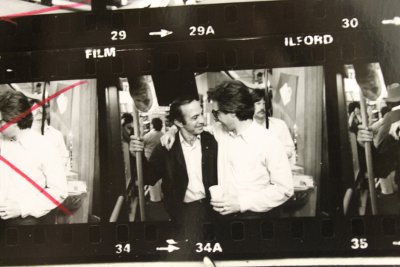
Bill, jij maakte de documentaire One Day Since Yesterday en die gaat vooral over They All Laughed. Natuurlijk is dit een film waar veel over gezegd kan worden, maar is het ook jouw favoriete film van Peter?
They All Laughed is zeker mijn favoriete film van Peter, en ik vind het ook zijn beste. Zoals Jesse Hawthrone Ficks het zegt: 'dit is hypercinema'. Het bevat alles wat je maar kunt weten over cinema. Het heeft elementen van de stille cinema, slapstick, romantiek, het heeft intriges en het bevat verschillende stijlen. Het is een soort Cassavetes-stijl maar dan in de jaren '40 en het heeft zelfs iets van Buster Keaton, maar allemaal op een nieuwe, frisse manier. Ik ben er dol op. Maar ik begreep ook dat deze film het belangrijkste in zijn leven was door de liefde die hij had voor Dorothy. Daarin was de film zelfs wat autobiografisch. Hij had al drie, vier of vijf geweldige films gemaakt. Het is zoals Bob Dylan. Bob heeft heel veel goede platen gemaakt, net zoals Peter goede films maakte. Maar dit ene kunstwerk, omdat het zo doordrenkt was van liefde kreeg bijna een buitenaardse dimensie. Ik vond het enorm dapper hoe hij zijn eigen leven wilde openstellen, en in het bijzonder naar mij toe wat ik probeerde te plaatsen in mijn documentaire.
Hoe was de reactie van Peter toen hij erachter kwam dat jouw documentaire voornamelijk over They All Laughed ging, deze film was tenslotte voor hem om vele redenen een tragedie?
Nou, dat vond Peter geweldig en hij wilde er meteen aan beginnen. Peter was er erg in geïnteresseerd omdat dit zijn favoriete film van hem was. Ik denk dat de film niet eens op dvd was verschenen toen ik erover begon, en dus was het voor Peter de kans bij uitstek om erover te praten. Hij hield zeer veel van They All Laughed omdat hij zoveel van Dorothy hield, ook al hield hij enorm van Louise (zij is Dorothy zus-red.) tot de dag dat hij stierf. De film is doordrenkt met al die liefde, maar het was erg moeilijk voor hem om er naar te kijken. De eerste avond dat ik de film voor hem in zijn appartement screende, werd hij erg ziek en kreeg hij nachtmerries. En ik voelde me er vreselijk door. Het was de eerste keer in al die jaren dat hij over dat soort dingen sprak. Misschien werd het achteraf gezien louterend voor hem om te weten dat via mijn documentaire de mensen zijn verhaal zagen, en dat het op een artistieke manier werd gedaan.
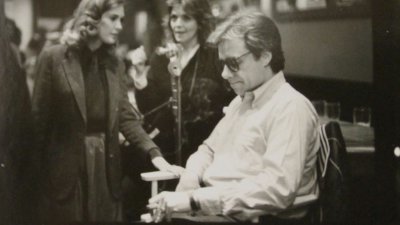
Sommigen beweren dat They All Laughed de laatste film van de jaren '70 is, denk je dat Peter die een typische regisseur uit de jaren '70 is, daar ook zo over denkt?
In veel opzichten is hij een typische regisseur uit de jaren zeventig en in veel opzichten weer niet. Ik ben het ermee eens dat het de laatste grote film van de jaren zeventig is. Ik denk dat 1981 het laatste jaar van de jaren zeventig is. Ik denk dat Reds meer een epos uit de jaren '60 is, net als Ragtime, Heaven's Gate, Blowout en dat soort dingen. Voor mij zijn de jaren zeventig ook het mooiste tijdperk. Ik ben een grote fan van Robert Altman, en van de films die Michael Ritchie maakte, natuurlijk ook Paul Mazursky: een typische regisseur uit de jaren zeventig in de zin dat mensen gewoon volgden waarin ze geïnteresseerd waren en auteurs veel vrijheid kregen. In dat opzicht was Peter een typische regisseur uit de jaren '70, hij maakte echt dingen die zijn eigen creatie waren zoals Mazursky of Coppola. En wat het onderwerp betreft, Peter was veel meer geïnteresseerd in vrouwen. Peter was veel meer geïnteresseerd in een zachte, verfijnde benadering van het leven. Er was niet veel brutaliteit. Er was niet veel pathos. Er was romantiek. Er was melancholie. En er was een zeer ingetogen elegantie en een poging om alle personages te begrijpen. Heel Renoir-achtig, zoals Peter zou zeggen.
Hier in België draaide They All Laughed maar een week in de bios, en voor zover ik weet was de film ook geen succes in de Verenigde Staten.
Ja, de film had het zeer moeilijk in de Verenigde Staten omdat Peter besloot om de film zelf te distribueren. En er is echt veel voor nodig om een film te verspreiden. De film speelde drie maanden in Seattle en had wat succes in L.A. maar ze hadden maar een bepaald aantal prints. En natuurlijk moet je vechten tegen de grote studio's. De grote studio's willen hun kerstfilms erin krijgen. En Peter had niet de kracht om met hun te concurreren, ook al kreeg het ongelooflijke recensies, ik bedoel, het was voor vele filmcritici een van de beste films van het jaar, maar het had gewoon gewoon niet het distributiemechanisme. Weet je, hij gebruikte zijn macht als beroemdheid om John Ritter in The Tonight Show erover te laten praten of om Colleen Camp in tv-shows te krijgen. Hij probeerde alles wat hij kon. Maar hij heeft zichzelf in een financieel kluwen geruïneerd door zijn passie voor Dorothy en de film. Je zou aannemen dat de film meer publiciteit zou krijgen omdat de hoofdrolspeelster was vermoord, maar het was een moeilijk jaar om publiciteit te krijgen omdat er zoveel grote films waren zoals Raiders Of The Lost Ark en Escape From New York. Het moet heel moeilijk zijn geweest.
Tegenwoordig is de situatie veranderd en hemelen mensen als Tarantino of Wes Anderson de film op vanwege zijn genialiteit. Hoe reageerde Peter daarop?
Weet je, ik herinner me dat het tijdschrift Sight and Sound Tarantino's lijst met zijn favoriete films aller tijden bijhield. Ik had dingen gezien in de films van Quentin. Ik had Jackie Brown gezien en dacht: God, dat herinnert je aan They All Laughed, en ik zag dat ook in Pulp Fiction. Ik las wel dat Quentin geïnspireerd was door Jim McBride's Breathless, maar ik had hem nog nooit horen praten over Peter. En ik geloof dat Jackie Brown eindigt met een bedankje aan Peter. Ik weet niet wat Peters reactie was toen hij zag dat de Quentin in Sight And Sound They All Laughed had genoemd als een van zijn tien favoriete films. Dat moet een enorme kick zijn geweest voor Peter. Hij moet telefoontjes hebben gekregen en dat moet hem in de wolken hebben gebracht. Tegen de tijd dat ik Peter ontmoette, had hij al contact gehad met Wes Anderson, die er ook dol op was. Ik denk dat hij echt ontroerd was dat ze zijn werk zo bewonderden.

Zowel Tarantino als Anderson komen in je documentaire voor, net als Ben Gazarra en Jeff Bridges. Was het moeilijk om ze te overtuigen om deel uit te maken van One Day Since Yesterday?
Het was niet zo moeilijk. Verrassend genoeg schreef ik met Jeff Bridges gewoon een e-mail via zijn website. Onderaan stond een knop met de tekst "contact opnemen met Jeff". En ik schreef hem een e-mail waarin ik zei: "Hé, ik ben bezig met een documentaire over Peter Bogdanovich. Wij willen je er graag bij hebben." Onmiddellijk kwam daar een positief antwoord op. Met Quentin was het vrij eenvoudig. Ik probeerde hem te bereiken via Colleen Camp en enkele assistenten, maar zonder succes. En uiteindelijk denk ik dat Louise Stratten (zus van Dorothy) hem belde. Ze is goed bevriend met hem. Quentin was een coole kerel en gewoon lief. En Ben Gazzara was de eerste die we interviewden.
Dat gezegd hebbende, vraag ik me altijd af waarom They All Laughed nooit een echte homevideo-release heeft gekregen. Ik weet dat er een vrij dure dvd is in de Verenigde Staten, maar is er een mogelijkheid voor een Blu-ray release, denk je?
Ik heb met iemand op HBO gewerkt. Zij was de redacteur die hielp met het samenstellen van de dvd uit 2006. Haar mentor was de persoon die de transfer van de allereerste video verzorgde voor de videocassette die in de jaren tachtig voor Vestron Video werd gemaakt. Ze had plannen voor een Blu-ray, maar toen begon ze voor The Simpsons te werken en verdwenen de plannen. Omdat al deze HBO-films nu opgekocht zijn door Warner Brothers, moet de film ergens in een doos liggen. Je moet mensen overtuigen om die dozen te gaan halen en aan de slag te gaan, enzovoort. Dus Rebecca en ik hebben uiteindelijk mensen overtuigd om die dozen op te kopen, maar daarna misten ze nog steeds de nodige papieren. Het lijkt erop dat er misschien binnenkort een streaming-release zal zijn en dat ze het misschien zullen aanbieden als iemand die op Blu-ray wil uitbrengen.
Pas aan het einde van They All Laughed wordt de kijker eraan herinnerd dat Dorothy is vermoord, terwijl je voor de rest een jonge vrouw ziet die alles in zich had om een Hollywood-actrice te worden en die echt kan acteren. Natuurlijk heb je geen toverbol, maar denk je dat er een heel lange carrière voor Dorothy Stratten mogelijk was?
Jazeker. Ik denk dat Dorothy Stratten een mooie carrière zou hebben gehad. Ze leek zo'n getalenteerde comédienne te zijn, en ik weet zeker dat ze ook drama had kunnen spelen. Ze kende zeker moeilijkheden in haar korte leven, zeker als je denkt dat ze pas 20 was. En ze was een vriendelijke vrouw. En van wat ik weet van haar zus, die een goede vriendin van me is geworden, was ze ook gewoon ongelooflijk aardig. Als je nadenkt over de toekomst die Dorothy zou hebben gehad, zowel met Peter als zijn vrouw en partner, wordt het nog triester.
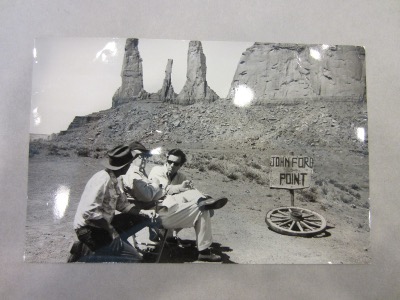
We hebben het beter over de tv-film met Jamie Lee Curtis, die naar mijn mening verschrikkelijk was, maar ik ben erg enthousiast over Star 80 van Bob Fosse. Ik weet dat Peter hem niet leuk vond, maar wat vind jij ervan?
Nou, ik schaam me heel erg om dit te zeggen, en ik geef het nooit toe als mensen met me over het verhaal praten, maar ik heb Star 80 nooit gezien. Ik zag They All Laughed toen ik 13 was. Net zoals Quentin het zegt, was ik nooit echt verliefd geweest of had ik nooit echt een vriendin gehad. Dus ik werd min of meer verliefd op films, en ik ben erin geslaagd om dit soort zeer romantische idee van liefde te behouden. Van wat ik heb gehoord, is Star 80 behoorlijk brutaal en gewelddadig. En ik denk niet dat dit het soort ideeën zijn die ik in mijn hoofd wil hebben omdat They All Laughed me zoveel vreugde bracht. In mijn documentaire vernoem ik nooit de naam van de kerel die Dorothy vermoord heeft. Ik heb geprobeerd om daar enige afstand van te houden. Wel heb ik Sam Wassons biografie van Bob Fosse gelezen. En het is grappig, want ik had net Lenny gezien in de New Beverly Cinema gezien, en daarna ook All That Jazz. En ik hou van de films van Bob Fosse. Dus ik waardeer het werk van Bob, maar Star 80 heb ik bewust geskipt.
Ik vind One Day Since Yesterday echt een van de beste filmdocumentaires die ik ooit heb gezien, mede door de liefde en passie die je laat zien. Ben je met iets anders bezig?
Bedankt voor de lieve, vriendelijke woorden over One Day Since Yesterday. Ik waardeer het zo. Echt waar. Ik heb er echt heel veel hart en ziel ingestoken. Ja, ik ben met iets anders bezig. Ik werk aan een film over een beroemde muzikant die ook een acteur is, maar ik mag nog niet zeggen wie het is. Ik ga ook werken aan de director's cut van One Day Since Yesterday, omdat nu dat Peter is overleden, ik langer wil maken.
Als mensen One Day Since Yesterday willen zien, hoe kunnen ze dat dan doen?
Nou, als mensen One Day Since Yesterday willen zien, kunnen ze het huren op iTunes of Amazon. En ik weet dat het wordt vertoond op de Poolse televisie en de Franse televisie. Het stond jarenlang op Netflix in de VS, maar nu niet meer. Ik denk dat de overdracht op Amazon en iTunes niet erg goed is. Het heeft niet de juiste geluids- of beeldoverdracht en ik probeer dat op te lossen. Ik hoop er het komende jaar een bredere release voor te hebben. En ze kunnen het ook op YouTube huren. Er is ook een dvd van Warner Bros die mensen kunnen kopen.
ORIGINAL VERSION
DVDInfo: Dear Bill, since Peter Bogdanovich passed away many things have been written about him, but the red line surely was the fact that he is considered as the last icon of a generation of directors who were at the same time movie buffs with a deep passion for cinema. Do you agree, and how do you see Peter as a director?
Bill:I think you're right. It's really sad because I'm very happy that Coppola is around and Friedkin and Scorsese. But we've lost Altman, Cassavetes, Joan Micklin Silver, These people that really studied the directors of the past. And of course, were movie buffs, but were also the new auteurs. And for me, the way I see Peter is I see him as the last of the old school directors and the first of the new school '70s auteurs. There's traditional filmmaking but Peter did it most boldly. There's a lot of blocking and things like that as opposed to cutting. And I feel that really only Peter and Spielberg seem to have have taken that lesson to heart from those guys. But Peter reminds me of Bruce Springsteen in the way that Bruce Springsteen, is he the last of the old rock stars or the first of the new rock stars? So I see him as really the first postmodern director, I would say that he's the link between the Hitchcock and Hawks and Ford and Sturges and Lubitsch and the New Generation with Altman and Coppola and Scorsese, Spielberg too - took a lot from Hawks and the past, but and both Peter and Spielberg seem to the only directors who still use that Oner or the one shot with so much blocking - but of course they're very different. And I see Peter as being the only one of those directors that was really in both worlds. Peter felt such an affinity for Springsteen's music, because like Peter, he was a student of the past, but he was infusing it with a very modern aesthetic. And like Peter, he was working within an established form, but in an entirely new way. And there's a really cool essay about Peter and Bruce and the things they have in common and the things they share with John Ford that was published in a wonderful Buenos Aires Film Festival book on Peter called Peter Bogdanovich: El Ultimo Testigo (The Last Witness), an essay by the festival director Javier Porta Fouz called Bogdanovich, Ford, Springsteen: Conexciones but yeah, I think Peter is the last of the old directors and the first of the new, the first truly postmodern director.
You were a very close friend of Peter, how did you meet him and weren't you starstruck as I recently read a quote from a Belgian film critic who said that it was very difficult to get in touch with Peter because he was a rather reserved person.
Yes, he was reserved. And of course, I was incredibly intimidated. I went to see him speak and at the same time, I was going to get a copy of my book signed. His second big tome of books. After he wrote Who The Devil Made It, this was the one about actors, Who The hell Is In It? And I was going to get it signed. And I brought my They All Laughed poster that I had collected. And we were waiting and in line to get it signed. And we were watching him speak. And my son's mother insisted that I ask a question. She was like, "You have to ask him something. You have to ask him something". And I was like, "What am I going to ask Peter Bogdanovich? You know, he's my hero". "you have to ask him something". So I got in line and when I got to the front of the line, I said, "Peter, you know, you've been speaking all"... I was the last person to ask a question. I said, Peter, "you've been speaking all night about all these great directors and all the things that they've done and how wonderful the films have been. But I think that you also belong in the pantheon because you're every bit as good as they are, and your films are just as wonderful and you're in the pantheon too". And he just smiled. And from the stage, which is very far from me, it was a very, very crowded event. Hundreds of people there. But he just smiled. He said, "Okay, I'll take that. Let's close with that one." And then he was receiving people as they were signing books. And I had worked in films and done some independent films. And I always included tributes to Peter in them. And my most ambitious one was about a little Cuban family in Miami. And I had a scene that quoted The Last Picture Show, and I had another scene that was an homage to They All Laughed. I had these little homages in the movie. I in fact, I had given Sam the Lion's speech, not that same speech, but the same camera move to this old Cuban exile man in Miami. And when I presented my stuff for him to sign and he saw that They All Laughed poster and he said, "Oh my God, where did you get this?" And his eyes lit up. I said, "Well, it's my favorite movie" - he said, "you've seen it?", because at that time it really was lost. And I said, "Sure, I've seen it, you know. And and he he looked at my son's mom and asked, You've seen it, too?" "Yeah. And it's our favorite movie. We love it". And then I added and, Saint Jack and he said "oh my God, you've seen Saint Jack?" We said, "Yeah, we love Saint Jack". We, we, we have it on DVD and we give it to people for Christmas so they can know about it." he said, "Oh, my God. You know, it's on DVD. And we said "Yes, we know." And he asked how I saw They All Laughed. I said, "Well, it played down here when I was 13, and I went back and I saw it every night for two weeks. And then I ordered this poster. You know, I've always had it and I always was dreaming for you to sign it. And, you know, I was 41 years old by then. And he was just so sweet And he was so kind and and he was like, "Well, what do you do?" And I said, "Well, I'm a filmmaker". And I told him i included a couple of homages to TAL and TLPS in this film that I made. he said, "Oh my God, please send it to me, get my assistant's information" , he was just so sweet. He said "it's so great to meet you. Thank you for the beautiful words about they all laughed", and he was just so sweet. People were saying, 'move the line along'. And the people organizing the book festival were like, 'come on, move the line along'. And Peter was just like, 'No, I want to talk to this guy'. And as i was walking away, I said, "I even love that song you wrote for Johnny Cash, Love Is A Gambler". And I'm getting farther away, and they are ushering me out - and he stands up from the table and yells after me , he goes, "I wanted to call the movie Love Is A Gambler, but De Laurentiis wouldn't let me! I should have!" And so that was pretty funny. And everyone in line and in the place was looking at us like, What the heck is going on? But he was genuinely touched. And it was really a special moment for me, because i just adore him. but, of course, I never sent him my stupid movie. The way that we began was I said as i handed him my book, for him to sign, I said, Peter, what did you think of the homages that Quentin did in "Pulp Fiction, in Kill Bill and in Jackie Brown?" He goes, "Yeah", and I told him the scenes that I thought Quentin was paying homage to Peter in those movies. And in that moment i think he knew he was talking to a guy who also really loved movies. He said, 'Are you a filmmaker?' I said, 'Yeah'. And I just thought it was very special. And, you know, he means more to me than I can express you. But I never sent him the movie. I thought, well, this guy's got Quentin Tarantino, who's one of my favorite directors, you know, making homages to him. He doesn't need to see my stupid movie. And then one night, I had this wild kind of cosmic, spiritual experience where I went out to the Everglades in the middle of the ursids meteor shower. It was the night of the winter solstice and also the full moon eclipse and this meteor shower. And there was a lot of power and magic in the air. And those events had not coincided for, I think, 400 years or something. And when I came back, I just had all this energy. I felt kind of transformed. And I thought, what do I do? And I had a little I thought, what do I most want to do? I most want to make a film about They All Laughed. So I just wrote to Peter that night. I found his assistant's email address that he'd give me 5 years earlier! And the very next morning there was an email from Peter saying, "I'd be honored. When do we start?" And I just can't even tell you what that meant to me and how that changed my life. I did get to be close friends with him. And what struck me was how kind he was, how polite and thoughtful he was. The writer James Kenney, who found Peter's cut of his movie Squirrels To The Nuts, talked about it in one of his articles, how Peter would call and say, 'how's your child? How is your wife? How's everything?' He would remember these strange details and ask you about them. And he was like that with people, whether it was a waiter or I mean, I think it was funny because for so long people thought he was sort of aloof, but really he had a very genuine love of people. He's just simply a reserved, internal person, but he's incredibly interested in the well-being of others. And he was very warm and very loving.
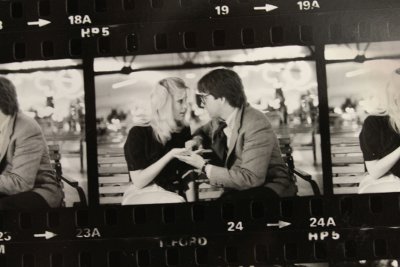
Peter loved actors, but he also loved directors whom he made stars. Peter himself was often seen in trailers to promote his own movies. Do you know how Peter handles the current situation in where there isn't any space to show the names of the directors and other people at the beginning credits of the movies?
As for the credits, it's very interesting, isn't it? Because. Peter understood the value of having a celebrity director and how good for a movie that was. And, you know, he understood it in the same way that Tarantino understands it, I think Quentin borrowed a little bit after Peter. And what's funny is that Peter was modeling himself after Lubitsch and after Sturges and after Capra and after directors for whom the fact that they had made the film was the biggest selling point of the film. And that was such a big part of the way films were sold in the thirties and forties. And Peter carried that image into the seventies, and I don't even know how many people understood that. It wasn't just Peter being very famous, it was also Peter paying homage to the way these guys did it - when Otto Preminger made a movie. Otto Preminger is making a movie and then he'd lead you through the trailer. And Peter was kind of doing that too, as an homage. So it's a very interesting way to do it. And the people that really dig him, like Wes Anderson and people like that, also get that director as star. Peter was telling me Spike Lee was a fan of his and he does the same thing. So it's understanding that it helps sell the movie and it helps people understand the movie. And it also speaks to the idea of auteurism. I never spoke to him about people shrinking down the credits, but I know that would have frustrated him because in his movies, even the credits were an extension of the movie, A movie like TAL, the story's continuing on in the end credits. So it's very interesting.
These days it's hard to be a director in Hollywood if you have an own vision. In many ways Peter was a rebel, but with a cause. Any idea what Peter thinks about the current situations in where streaming services follow all the safe lines?
What did Peter think about the streaming services and following all the safe lines and and and how hard it was to make an original movie these days? You know, he was always just so diligent trying to get his films done. But last year I spoke to him at Christmas and he was so excited about this movie that he and Louise were writing about George and Ira Gershwin. And I know that a very big film director whose name I'm not going to mention was going to walk that movie into Netflix so that he could act as a backer and producer and get it made with Peter directing. And Peter was just so passionate about making that movie or when he was trying to get Wait For Me Made, you know, this beautiful, romantic epic with these ghosts, an epic comedy with ghosts. And he was trying to get that. I mean, he was so passionate about making his films and he knew that things were difficult, but he never let it deter his work ethic for one moment. The man had a steel work ethic! The same way he watched his father wake up, paint as soon as the light was up, and then till the light was gone. And then he'd play the piano for 2 hours after it was dark. And that was Peter when he was writing one of his beautiful books or his screenplays. He just was so diligent about his articles, so diligent about writing. It was an uncanny ability to focus. I don't know how you categorize a brain like that. But he had an incredible mind for facts and details and cataloging and focus. He just had an incredible focus. So he never let the current environment deter him. He just simply pressed on. Although, of course, I would hear him express in interviews that maybe he wasn't so happy with the current state of pictures, but he never let it daunt him when he was trying to get his own films made, which he was doing literally the day he passed from this plane to another. He was working on his film.
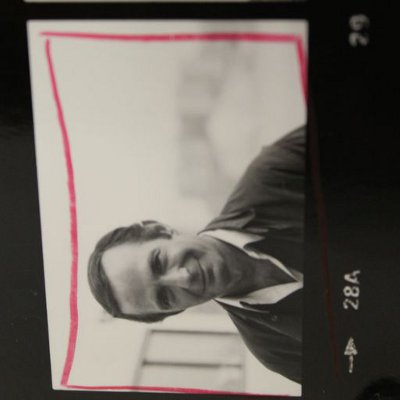
In fact, do you think Peter could make his movies now as he did back then? I mean, how genius they are, almost of them were risks for studios. A black and white movie in 1971 (The Last Picture Show) or a movie about pioneering in cinema (Nickolodeon) are not what you'd call obvious choices!
I do think they would have let Peter make his movies today because they were popular. His movies were critical and commercial successes. when they became challenging, sometimes commercially, it became more difficult. But as long as they were making money, people gave him carte blanche. And I see that today, David Fincher can make a movie like Mank or Guillermo del Toro can make these very original, strange films. I think if you're successful, which Peter really, really was, and if you're a brand, which Peter really, really was, you can get it done. And he also knew how to play the game. He knew how to play the game so well. I always feel like Peter was just one step away from finding the right executive that would believe in him and give him a chance again.
Your documentary One Day Since Yesterday is mainly focused on They All Laughed. Of course this is the movie about lots of things can be said, but is it your favourite film by Peter?
Yes. My documentary is focused on TAL because it's my favorite of Peter's films. I feel it's his best film. And I was also so intrigued because it had been lost for so long, and I think there's no movie like it. I really don't even think we've caught up to movies like that. As Jesse Hawthrone Ficks says, 'it's hyper cinema'. It's sort of like every single thing you could possibly know about cinema. It's got silent cinema, it's got slapstick, it's got romance, it's got intrigue, it's got different styles. It's like kind of Cassavetes style meets 1940 style meets, Buster Keaton style, I mean, it's really doing a lot of things, but it's all doing it in a very brand new, fresh way. I'm enamored of it. But I also understood that it was the big thing in his life, the love he had for Dorothy, the love that's embedded in that movie, the way that things that got set into motion on that movie really changed the course of his life, his family's life. And in that the movie itself was autobiographical. And it's very strange that a work of art from an artist turns in on itself and spins and spins and spins and becomes a defining moment, especially when he's already a great artist. He'd already made, you know, arguably three or four or five great, great, great movies, maybe six or seven great, great, great movies. And so it would almost be like if when Bob Dylan made Blonde on Blonde, that his life went spinning haywire and then everything became about the people he made blonde on blonde with for the rest of his life. That that didn't happen. Bob made many, many good records, and so did Peter. But this one piece of art, because it was so infused with love and no cynicism, it took on almost otherworldly quality and... And I'm very interested in how that affected Peter and how it affected his life and how life affects art. But mostly I'm interested in this incredible man, this incredible artist, and he was cool and brave enough to open up his life and and work to me. And I was just very blessed to have that opportunity.
How was Peter's reaction when he found out that the documentary was mainly about They All Laughed as after all this movie was for many reason a tragedy for him?
Well, Peter loved that. It was about they all laughed and that was my pitch to him. I said, Would you allow me to make this film? About They all laughed. And he said, When do we begin? He was usually excited for anything to do with They All Laughed. He was very interested in because it was his favorite movie of his and when I talked to him about it, it was lost. I don't even think that it hadn't even been out on DVD. So it meant a lot to him to have an opportunity to talk about it and to have that information be out there and so forth. It was a tragedy for him, but he loved the movie and he wanted as many people to see it as possible. He felt it was his best movie and also because he loved Dorothy so much and it was all about her - cause he loved Louise as well until the day he died. And the movie's infused with all that love. But it was very difficult for him to watch. The first night I screened it for him at his apartment, he became very ill. He was up all night, very ill - and nightmares. And I felt terrible. And. The next night. It was the first time he talked about that stuff in all those years. And then the first time I screened it for him was more of the same. And then after the first screenings we attended, he would be ill. And so we'd watch the movie, he'd laugh and then I'd say, just before the part with the murder, Let's go outside. And we'd go outside, you know, right before the murder happens in the movie. And then we'd come in a little bit towards the end. There was no reason to put him through it, you know. But I sat next to him at several screenings, and it's really brutal for him to watch, even though he enjoyed the crowd enjoying the movie, it's like you're seeing your life. But here are the best moments and here are the worst moments. But we're going to linger on this tragedy that must have been incredibly difficult. But he's such an artist and such a cool guy that he allowed me to do it. And maybe it became cathartic for him in a way to see that people were seeing his story, and that it was done in an artistic way. I mean, it had been on an exploitative TV show called Hard Copy and there were movies based on it, but in my opinion they were exploitative - and they were made without Peter's and Dorothy's family's cooperation. But, I tried to do it with some grace. Treat things with the respect that they deserve.

Some say They All Laughed is the last movie of the '70's, do you think Peter is a typical '70's director, for many film fans the greatest area of movie making?
In many ways he is a typical seventies director and in many ways he's not. I do agree that it's the last great movie of the seventies. I think 1981 is the last year of the seventies. I think Reds is more like a 1960s epic, as is Ragtime, but so many kind of last gasp, auteur movies, Heaven's Gate, Blowout, things like that, and that era of making films. I think, is very much like that. And. So I do think they all laughed as the last great movie of The Seventies, because it's a true auteur work, and I think it's the best of those movies. For me, the 1970s is also the greatest era. I'm a big fan of Robert Altman's, and the movies Michael Ritchie made, of course Paul Mazursky made so many great but i do think he's a typical seventies director in the sense that people were just following what they were interested in and auteurs were given a lot of free reign. And in that regard, Peter was a typical '70s director, was really making things that were his own creation the same way, say Mazursky or Coppola or someone like that was. But I don't think he was a typical seventies director in the way that he was telling them. And in the subject matter, Peter was much more interested in women. Peter was much more interested in a genteel, sophisticated approach to life. There was not a great deal of brutality. There was not a great deal of pathos. There was romanticism. There was melancholy. And there was a very understated elegance and an attempt to understand all the characters. A very Renoir-esque, as Peter would say, sense that 'the is the saddest thing in life is that everyone has their reasons'. And so. He was very different in that he wasn't dogmatic. He was enthusiastic. And in that regard, he probably is almost alone. Probably his friend John Cassavetes would be another one that would be like him. But there were few.
Over here in Belgium the film only ran for a week, as far as I found out the movie wasn't a succes either in the States. Can you remember how people were receiving it, after all it featured a star who was brutally murdered and I guess because of this the movie got extra attention, didn't it?
Yes, it endured a very difficult run in the United States because, Peter decided to distribute the movie himself. And it really takes a lot to distribute a movie. And Peter was doing his best and so he'd have big hits with it here and there. It played, three months in Seattle and great successes in L.A. but they only had a certain amount of prints. And you're fighting against the big studios. The big studios want to get their Christmas movies in there so they would use their muscle to push out smaller movies. And Peter didn't didn't have the the muscle behind him to distribute it properly. So even though it got incredible reviews, I mean, it was one of the best movies of the year on so many critics lists. It just simply just didn't have the distribution mechanism. You know, he used his celebrity power to get John Ritter on The Tonight Show talking about it or to get Colleen Camp on television shows, like the American television show WKRP in Cincinnati talking about it. And in order to coincide with, you know, when it was going to open in different areas. So he really tried. I mean, he tried to get Collen nominated for an Oscar and invited academy goers to a special screening. And he tried every single thing he could. It was so romantic and beautiful the way he tried, but he was unable just because that's a job for a giant publicity department by a giant studio with just so much money. But he basically kind of ruined himself financially doing this because of his passion for Dorothy and because of his passion for the movie. You would assume the movie would get more publicity because it had the star who had been murdered. But it was a difficult year to get publicity because there were so many big movies this The Year of Raiders Of The Lost Ark and Escape From New York and, you know, all these big movies. And so it was hard for him to get press on it. He did get the reviews, and he if he just had the proper backing behind him, I think he could have really made a run for it. But it was such a difficult time and he was in so much grief and agony. It must have been very difficult.
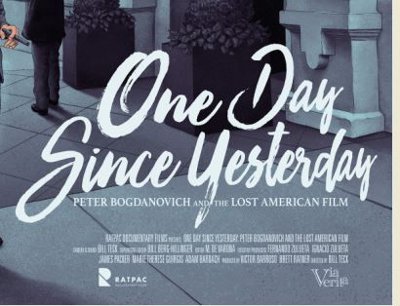
These days the situation has changed and people like Tarantino or Wes Anderson are hailing the movie for its genius. How was Peter reacting to that?
I think it must have blown Peter's mind. You know, I remember that Sight and Sound magazine ran Tarantino's list of his all time favorite films. I had seen things in Quentin's movies. I'd seen, you know, Jackie Brown and thought, God, that reminds you of they all laughed. I'd seen things in Pulp Fiction and thought, That reminds me of they all laughed. But I had never read Quentin discussing Peter. I read him talk about, say, Jim McBride's Breathless, but I'd never heard him talk about Peter. And I believe Jackie Brown ends with a thank you to Peter, as does Kill Bill, I believe. But maybe I'm not remembering it right. But that's a beautiful, romantic thing to do, you know. But when it came to. I don't know what his reaction was when he saw the Quentin had named it in Sight And Sound as one of his ten favorite films to see. That must have been an immense thrill for Peter. He must have gotten phone calls and it must have put him over the moon. But by the time I'd met Peter, you know, these guys were already championing it. By the time I met Peter, he'd already been in touch with Wes Anderson, who adored him. And, was trying to help him get Squirrels To The Nuts (later released as She's Funny That Way) made. So I think it thrilled him to have these younger directors admire him. People like Noah Baumbach or Alex Ross Perry. Actually, these guys, they love him. And I think he was really touched that they admired his work so much.
Both Tarantino and Anderson are in your documentary, just like Ben Gazarra and Jeff Bridges. Was it difficult to convince them to be a part of One Day Since Yesterday?
It was not that difficult. Surprisingly, with Jeff Bridges, I simply wrote an email to his website. Jeff Bridges has one of the most beautiful websites I've ever seen, and especially so about ten years ago. I mean, it was just like, I've never seen a website like that. It was like you were lost inside a painting... so beautiful. And at the bottom of it was a button that said "contact Jeff". And I wrote him a an email saying, Hey, I'm doing a doc about Peter Bogdanovich. We'd like to be in it. And we actually had wrapped up shooting and then we heard from Jeff Bridges, "Yeah, I want to be in it" And we were like, "What?!" So we had to open up shooting again and and start all over. And with Quentin, I think it was fairly easy. I tried to reach him through Colleen Camp. I tried to reach him through some assistants of his - but no luck. And then eventually I think Louise Stratton just called him. She is good friends with him. And so that was pretty cool. And he was he was just such a gentleman and such a great dude about it, you know, really a cool guy and just sweet. And Ben Gazzara was the first guy we interviewed. And it was interesting because I thought, well, let's get the older guys first. We'll get Ben Gazzara, we'll get Andrew Sarris. And it was actually the last interview that Ben gave and Andy as well. May he rest in peace. And Ben right away said yes. He said, "Well, what what's this thing you want to do for Peter?" I said, pick a date. Ben said, "How about three weeks from Tuesday?" So I flew up to New York and it just so happened that the first day of shooting. That he'd picked out... also happened to be Dorothy Stratten's birthday. And of course, the dates are very important for Peter, and it just so happens we got into Venice around those dates and it just so happened we did a premiere in Miami on her birthday. So it's very, um, very cosmic the way these kind of events fell together. Wes Anderson I kept trying to schedule with and I couldn't. But after the film showed in Venice and showed in Vienna, I was able to finally get Wes and Noah Baumbach, which was exciting. And so I flew to Paris to interview Wes Anderson, and got to interview him in his office, which was so cool. And he was, of course, another total gent.
Having said that, it always makes me wonder why the movie never got a proper home video release. I know there is a quite expensive dvd in the States, but is there a possibility for a Blu-ray release, you think?
It's very interesting. I've been working with someone at HBO. She's a very special person that has been a part of this movie forever. She was the editor that helped find all the trims and put everything together so they could make that DVD back in 2006. And her mentor had been the person that had supervised the transfer on the very first video for TAL when they did a video disc and the video cassette back in the eighties for Vestron Video. Coincidentally, she became an editor and she helped Peter put everything together for the Blu ray. And then she continued in the business. She became an editor on The Sopranos. She's really an interesting person. It's been pretty fascinating how Peter just keeps popping up in certain people's lives and in this case. She and i have been trying to clear the paperwork and the music rights - and we've gotten some top brass at HBO to help us. It's been unavailable because someone flagged it, but there was no way to find out why it was flagged. Because all these movies that that were purchased by HBO and now Warner Brothers that were part of Time-Life, you know, all the legal paperwork isn't really even in an office. It's in boxes, offsite in some storage facility somewhere. So you really have to go in there's all these great movies, but they might have gotten flagged for some reason. But you have to convince people to go get the boxes and get it going and so forth. So Rebecca and myself finally convinced people to get the boxes. And then after that, they were still missing papers. We went to the Lilly Library ,where so many of Peter's papers are, in Indiana and got more boxes from there. And we've been able to piece it together. And it looks like maybe soon there'll be a streaming release and then maybe they'll offer it up if someone wants to put out a Blu ray. Many people have expressed an interest, but it's been a flagged title. We're hoping to remove that and get that out there to the world.
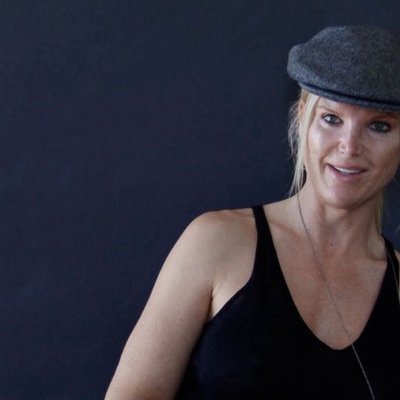
It's only at the end of They All Laughed the viewer is reminded that Dorothy was slaughtered where as for the rest you see a young woman who was born to be a Hollywood actress and who can really act. Of course you don't have a magic globe but do you think there was a real long career possible for her if she was still with us?
Yes, I do. I think Dorothy Stratten would have had a beautiful, beautiful career. She seemed to be such a talented comedienne, and I'm certain she could have played drama as well. She certainly knew difficulties in her brief life. When you think she was only 20. And she was a kind soul. And from what I know and I certainly know her sister,who's become a good friend. She's just incredibly kind as well. And so, I do think she would have had a beautiful, long career. Certainly, you know, having a mentor like Peter and all the people around Peter would have been a gift. I mean, it's as you say, I mean, the tragedy really is quite haunting. It's the saddest aspect of the whole sad story. But when you think about the future that Dorothy would have had, both with Peter as his wife and partner, and in the movies, it becomes even sadder.
We better don't discuss the Jamie Lee Curtis tv movie which was terrible in my opinion, but I'm really keen on Star 80 by Bob Fosse. I know Peter didn't like it, but what's your opinion about it?
Well, I'm very embarrassed to say this, and I never admit it when people talk to me about the story. I always act as if I've seen it. But I don't think if I had seen it, I would have made this documentary. I don't think if I had seen it, I would have remained as interested in They All Laughed because I saw They All Laughed when I was 13. Like Quentin says, i had never really been in love, never really had a girlfriend. So I kind of fell in love with the movies, and full of this feeling of love. And I have managed to keep this kind of very romantic idea of love. From what I've heard, the movie Star 80 is pretty brutal and violent. And I don't think those are the kind of ideas I want to have in my head. Because the movie, they all laughed and the ideas of it... bring me such joy. Like even my documentary. It's not a hardcore documentary. It's almost like a fantasy documentary. I never say the name of the man who murdered her, in much the same way that the husband doesn't have a name. And they all laughed, my documentary is more about the movie, They All Laughed and how the things that happened to that movie affected Peter-more than it is about the details of the sad ending on one plane of existence of a human being named Dorothy. And what she went through. I have tried to keep some distance from that because I feel like it would change my perception. And my perception is very important for me to be able to execute what I have to execute. And now I'm going to be working on a director's cut. And I wanted to want to keep that kind of romantic fantasy feeling. And I feel that that film, although it's still not a documentary, it's still a work of fiction, it may provide me with a point of view that I am not really looking to embrace. I did, however, read Sam Wasson's biography of Bob Fosse. And it's funny because I just watched Lenny at the New Beverly Cinema, Tarantino's Cinema in Hollywood, and I just watched All That Jazz there as well. And I love Bob Fosse's movies. So i very much enjoy and appreciate Bob's work - it's just that it's almost like I felt I had this mission to make this movie, and I didn't want anything to affect my approach to the movie.
I really think One Day Since Yesterday is one of the best movie documentaries I ever saw, partly because of the love and passion, you show. Are you working on something else?
Thank you for the kind, kind words about One Day Since Yesterday. I appreciate it so much. I really, really do. I really did put a lot of heart and soul into it. Yes, I am working on something else. I'm working on a film about a famous musician who's also an actor -but i'm not allowed to say what it is yet. But I'm really excited. I can't give details about it right now, but it's got a lot of stars in it and a lot of music. And I'm very, very excited about it. And I'm also going to work on the director's cut of One Day Since Yesterday, because I think now that Peter's passed, I'd like to expand that and make it a little bit longer and play with some things that I wasn't able to play with.
If people want to see One Day Since Yesterday, how can they do that?
Well, if people want to see One Day Since Yesterday, they can rent it on iTunes or Amazon. And I know it's shown on on Polish television and French television. It was on Netflix in the US for years, but it's not anymore. I think that the transfer that's on Amazon and iTunes is not very good. It doesn't have the proper sound or picture transfer, and I'm trying to fix that. I'm working to get that replaced. I hope to have a wider release for it in the coming year. And they can rent it on YouTube as well. But I do hope to have a wider release for it in the coming year. There's also a DVD from Warner Bros that people can buy.
Andere artikels van hetzelfde type
- 2022-10-08 :: INTERVIEW RAF GEUSENS
- 2021-11-18 :: INTERVIEW ANKE BROUWERS
- 2021-09-21 :: TEN MOVIES MET ALEXANDER DE MAN
- 2021-05-23 :: TEN MOVIES MET ANTHONY PALAIA
- 2021-02-04 :: TEN MOVIES MET CHRIS CRAPS
